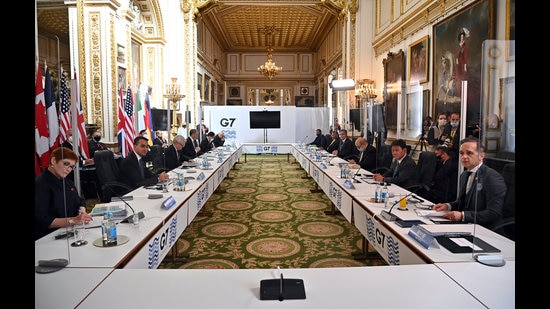G7: A strong message on democratic values
Could the PM’s public support for the values of democracy mean that he now plans to stop his government from veering further towards limiting the freedom of expression?
British Prime Minister (PM) Boris Johnson chose one of England’s favourite holiday destinations to host the G7 summit, the southernmost county of Cornwall. And there seemed to be a holiday-like atmosphere at the summit, at least as seen on television.

But behind all the camaraderie, serious differences are bound to have surfaced. The issue of the Northern Ireland Protocol, under which Northern Ireland, though no longer part of the European Union (EU) after Brexit, continues to follow many of the EU’s rules, came up. The protocol provides for checks on goods going from Britain to Northern Ireland to prevent them from passing through the region and into the European single market. Johnson has threatened to suspend the protocol for being detrimental to British interests, drawing the wrath of leaders such as Macron who want Johnson to stick to the commitment made when the protocol was negotiated.
United States (US) President Joe Biden has made it clear that he is deeply concerned that the dispute over Northern Ireland could endanger the agreement, brokered by his country, which ended hostilities between the Catholics and Protestants.
The pandemic, predictably, figured in the discussions. G7 countries agreed that something had to be done to help the poorer countries, which weren’t able to procure vaccines. The outcome was a pledge to supply one billion vaccines for poorer countries till the end of 2022, something experts widely described as inadequate.
PM Narendra Modi, attending the summit virtually as a guest, called for support to the Indian and South African plea for a relaxation of the intellectual property rights protecting the manufacture of Covid-related products. But there was no agreement on this contentious issue.
So, did the G7 summit amount to nothing more than a pleasant holiday by the sea? Joe Biden did not think so. He saw the summit in wider terms than mere dollars, pounds or even vaccines, important as they are. He saw it as demonstrating the contrast between democracies and autocracies. After the autocratic conduct of former President Donald Trump, Biden was signalling that he was putting the US firmly back on the side of democracies.
Modi did the same, describing India as a natural ally of the G7 and claiming that the values of democracy were “enshrined in the Constitution and the civilisational values of India”. He supported the adoption of the summit’s “open societies statement” defending the freedom of expression, off and online.
India is undeniably a democracy. It holds regular elections, the exception being the period of the Emergency. Election results have been accepted by defeated parties, as they have been in the case of West Bengal, even if not always with good grace. It has a vibrant Constitution and the institutions that uphold democracy. But there have to be some doubts over one of the essential elements of democracy —freedom of expression. The judges of the Supreme Court who dismissed the case against journalist Vinod Dua and now the Delhi High Court granting bail to the three young activists have made the judiciary’s views on freedom of expression clear.
Could the PM’s public support for the values of democracy mean that he now plans to stop his government from veering further towards limiting the freedom of expression?
One step he could take is to tell his law minister to drop the new internet rules, and concentrate on long-overdue reforms in the legal system which took away the freedom of those young activists for a whole year before granting them bail. That would be really walking the talk.
The views expressed are personal



